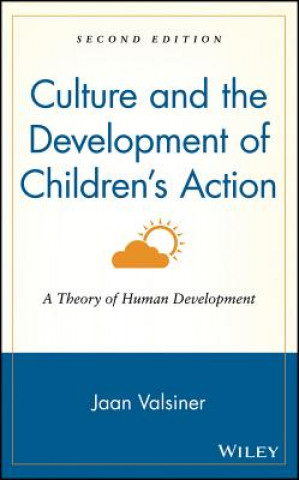
Dostava
Savjetnik za kupnju





Proizvod vam ne odgovara? Nema veze! Možete nam vratiti unutar 30 dana
 Poklon bon
u bilo kojoj vrijednosti
Poklon bon
u bilo kojoj vrijednosti
S poklon bonom ne možete pogriješiti. Za poklon bon primatelj može odabrati bilo što iz naše ponude.
Culture and the Development of Children's Action: A Theory of Human Development 2e
 Engleski
Engleski
 297 b
297 b
30 dana za povrat kupljenih proizvoda
Moglo bi vas zanimati i


In this deeply probing, intellectually challenging work, Dr. Jaan Valsiner lays the groundwork for a dynamic new cultural-historical approach to developmental psychology. He begins by deconstructing traditional developmental theory, exposing the conceptual confusion and epistemological blind spots that he believes continue to undermine the scientific validity of its methodologies. He describes the ways in which embedded cultural biases shape interventional goals and influence both the direction research takes and the ways in which research data are interpreted. And he suggests ways in which researchers and clinicians can become more aware of and transcend those biases. Dr. Valsiner then develops a hierarchical, systemic model that portrays development as an open-ended, dialectical process. Central to Valsiner's approach is the premise that, since each child is unique--as are his or her life conditions--deviations in function or the rate of development from a prescribed norm are just as likely to be constructive adaptations to changing environmental pressures as symptoms of psychological disorder. Drawing upon sources as varied as linguistic philosophy, structural anthropology, thermodynamics, and systems theory, as well as the work of many of the leading figures in twentieth-century developmental theory, Valsiner argues convincingly for an approach to developmental psychology mature enough to recognize the difference between healthy variability and dysfunction. In later chapters the focus shifts from development in the abstract to the everyday challenges encountered by the developing child. Case histories illustrate the subtle interplay of cultural, physiological, and psychological factors in shaping childhood behavior. Called an "intellectual tour de force" by the Bulletin of the Menninger Clinic, Culture and the Development of Children's Action is important reading for developmental psychologists, child psychologists, and all child clinicians. "Of course, no science progresses in a linear fashion. It moves interdependently with the society in which it is embedded, making use of the narrative forms in describing itself to its insiders and outsiders. The rhetoric of scientists about their science is therefore necessarily inconsistent. Sciences are both social institutions within a society and social organizations that attempt to build universal knowledge. It is a complicated task for psychology to be both knowledge-constructing and self-reflexive at the same time. Nevertheless, it is the latter kind of reflexivity that guides the actual construction of knowledge." -- Jaan Valsiner "[This book] is a fascinating and important work that challenges much of contemporary developmental psychology. The Second Edition has changed in a number of respects, and much new material has been added, but at root, Valsiner grapples with the question 'how shall we understand development?' He continues to struggle also with what he describes rather vividly as the 'epistemological windmills of psychology.' His challenge is summed up succinctly in two lines from a poem by T. S. Eliot: Where is the wisdom we have lost in knowledge? Where is the knowledge we have lost in information?" -- -- from the Foreword by Kevin Connolly
Informacije o knjizi
 Engleski
Engleski




 Kako kupovati
Kako kupovati




























